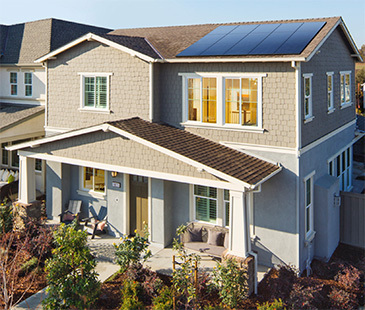
Editors Note: In 2020, SunPower announced the completion of the strategic spin-off of its manufacturing division into a separate business named Maxeon Solar Technologies, Ltd. As a result, SunPower has expanded its offerings to drive future growth. The SunPower Equinox® system now offers multiple panel options, including front- and back-contact panels, all of which are responsibly and rigorously quality tested to provide the best energy solution for your home.
With summer heat waves in full swing, homeowners and business owners who rely on conventional power sources to keep cool are likely asking: "How can I reduce my electric bill?"
While it takes plenty of power to run an air conditioner, with some parts of the U.S. hitting triple digit temps, we know running heaters during those East Coast winters can be equally hard on the pocketbook.
Many of our customers say they went solar with SunPower to reduce their electric bill.
“When I retired in June 2014 and moved to sunny Palm Springs, CA, I had no idea how expensive electricity is here,” said one customer, who submitted his solar story for a SunPower contest. “I have a 2,500-square-foot, two-story home. Imagine my surprise when I got my first monthly electric bill for $850! I quickly made the decision to go solar and had 30 SunPower® panels expertly installed on my roof.” (Read more Why I Went Solar stories on our blog and our solar community page.)
If you’re thinking about going solar, we’ve published dozens of articles and videos to help you learn more about this clean energy source. We suggest you start with our Quick Guide to Going Solar.
Along with switching to solar energy, there are numerous other things homeowners and business owners can do this summer or any time of year to help reduce a high electricity bill.
5 easy ways to reduce your electric bill
1. Install a smart thermostat. Controlling your heating, ventilation and air conditioning system with a rudimentary up/down switch on a basic thermostat will not do much to help you save money on your electric bill. Instead, install a smart thermostat.
This lets you set up cooling and heating patterns according to when your home or business will be occupied. You can save money by automating the air conditioner to only turn on the weekends, for example, when the family is home, or on the weekdays, if you’re running an office.
A smart thermostat can be controlled online, letting you update settings via your smartphone, giving you more opportunities to cut costs.
According to the Heat and Cool Efficiently page of the government’s ENERGY STAR program, pre-programmed thermostat settings can save you about $180 per year in reduced energy consumption.
2. Add weather stripping. Your home will be more energy efficient if you add weather stripping. Sealing cracks along doors and windows stops warm air from escaping during the winter and keeps cold air in during the summer.
3. Air-dry laundry. Use a clothesline or portable rack to air-dry wet laundry. If you don’t like the feel of naturally dried fabric, pop the load in the drier just briefly. Dryers are among your most expensive home electrical appliance to operate. In the U.S. dryers are blamed for emitting 32 million metric tons of carbon dioxide annually, the equivalent in greenhouse gas emissions to more than 76 billion miles driven by an average car.
4. Switch to LED lighting. To save energy, many people now use compact fluorescent bulbs. You can save even more power (and money) when you opt for the newer LED bulbs. They use less energy to produce light and last longer than fluorescent bulbs — as much as 25 times longer than conventional bulbs. Aesthetics, which are important to SunPower, have improved significantly over the years as well, with many options delivering a warm incandescent-like light. Replacing 15 bulbs with LEDs can save you $50 per year, according to the Energy Saver report on energy efficiency and renewable energy from the U.S. Department of Energy.
5. Turn off appliances not in use. It’s important to turn off electronics when you are not using them. This means switching off the TV, computer monitor or lights when you leave a room for any length of time. Installing motion sensors to control your lights is one way to take care of this chore. To turn off a lot of electronics at once, plug them into a power strip and use the on-off switch.
While going solar is one way to create more self-sufficient energy future, the path to a more sustainable world can start with small steps. We all have to change our habits to reduce the amount of energy we consume.
Interested in learning more? Try our solar calculator to see whether going solar is worth it.
If you’re ready to talk to one of our solar advisors, fill out this form and we’ll get in touch with you. You can also call us at 1-800-786-7693.

